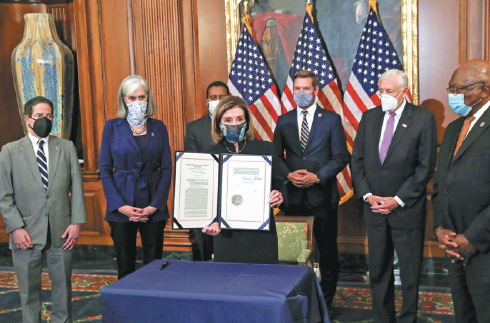President exit won't end divisions in US
Second impeachment makes history, but nation's angst not going anywhere

What's more striking than US President Donald Trump's history-making second impeachment is that the divide his four-year term has brought to the United States may last well beyond his departure, experts said.
In a heavily fortified US Capitol building, a majority of bipartisan members of the House of Representatives voted in favor of impeaching Trump on Wednesday, accusing him of inciting an insurrection last week at the very building in which the lawmakers cast their votes.
Following the 232-197 vote, Trump became the first US president in history to be impeached twice. What distinguished the second impeachment from the first one, though, was that this time 10 Republicans cast the "yea" vote. None of the House GOP members crossed the party line last time.
House Speaker Nancy Pelosi said of Trump after the vote: "He must go, he is a clear and present danger to the nation that we all love."
In a statement published on Wednesday, US President-elect Joe Biden said the riot "carried out by political extremists and domestic terrorists, who were incited to this violence by President Trump" was "an armed insurrection against the United States of America".
William Banks, distinguished professor emeritus at the Syracuse University College of Law in New York, said the House vote on impeachment was not surprising.
Some Republicans joined because Trump lost the election, he can't impact them directly in the future and, in addition, Trump's actions were far more grave and harmful this time around, Banks told China Daily.
"I predict no conviction in an eventual Senate trial, and with luck the Senate will relegate the trial to off hours so they can begin working on the Biden agenda," Banks said."It should have little impact on the Biden administration."
As the impeachment trial in the Senate will not occur until after Biden is inaugurated on Jan 20, Cal Jillson, a political scientist at Southern Methodist University in Dallas, said there might be not enough votes to reach the two-thirds requirement to convict, even though a number of Republicans will join all of the Democrats.
Without due process
Among those Republicans who opposed impeaching Trump, few of them defended the president. They argued instead that the Democrats were rushing to remove the president without due process and at a time when Trump will hand over the presidency to Biden in merely a week. They accused the Democrats of further dividing the country.
House Minority Leader Kevin McCarthy acknowledged that Trump "bears responsibility for (last) Wednesday's attack on Congress by mob rioters", but stressed that "impeaching the president in such a short timeframe would be a mistake".
Signs of this lasting effect have already been evident during the fallout of the Capitol riot. The president's allies in Congress continued to press ahead with overturning the election results even after the rioters put them under siege, while the Democrats not only demanded his removal this time, they also sought to ensure that he is never capable of holding any public office in the future.
"It's painful and frustrating for the country," said Christopher Galdieri, assistant professor at Saint Anselm College. "I don't think impeaching Trump fixes that."
As for banning Trump from running for president again, which came to the spotlight after the Democrats demanded it in the current impeachment resolution, analysts said achieving that goal could be time-consuming.
Depriving Trump of the chance for future presidential campaigns is based on Section 3 of the 14th Amendment of the US Constitution, which disqualifies federal and state officeholders who "have engaged in insurrection or rebellion" from holding office again.
Daniel Hemel, professor at the University of Chicago Law School, in a recent analytical piece carried by The Washington Post, said:"It is true that Congress potentially can use the amendment to bar Trump from future office, but the process will very likely take several steps and years."
Noting that enacting a new law would be a preferred option if the goal is to invoke the Section 3 penalties, Hemel said the legal action could not even get started unless and until Trump declares his next presidential bid."So if Trump seeks the White House in the next election, the legal process might not even begin until 2023."
Zhao Huanxin in Washington,Ai Heping in New York, Xinhua and agencies contributed to this story.

Today's Top News
- Hainan's special customs operations start strong
- Macao SAR holds flag-raising, reception to mark 26th anniversary of return to motherland
- China issues rules to regulate pricing practices of internet platforms
- US hits over 70 IS-linked targets in Syria in massive retaliatory strikes
- Coffee needs cooperation, not confrontation
- Technological innovation brings cultural heritage alive






























